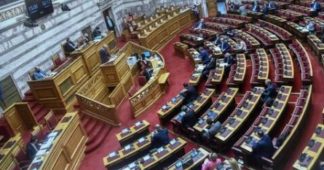Opposition lawmakers cry foul as Mitsotakis administration neutralizes officials investigating Athens wiretaps.
By Nektaria Stamouli
October 26, 2023
The government of Greek Prime Minister Kyriakos Mitsotakis is being accused of trying to neutralize the regulators that have been pursuing it over a scandal involving the wiretapping of politicians and journalists.
Greece’s espionage scandal — dubbed “Predatorgate” — exploded in the summer of 2022 when Socialist leader Nikos Androulakis discovered an attempted wiretap on his phone with malicious spyware, followed by the revelation he had also been under surveillance by the state spy service.
Since then, the saga has morphed into a labyrinthine espionage thriller that involves malicious spyware Predator being planted on the phones of an ever-expanding network of politicians and journalists. The government denies using the illegal spyware.
In the latest twist in the scandal, a magistrate has summoned former and current members of the independent watchdog (ADAE) as suspects for leaking classified information, according to several officials.
ADAE has been conducting a rigorous investigation into the case and the move is seen as another effort to intimidate those scrutinizing it.
“It is remarkable that the Greek justice system, that has not up until now — after 18 months — done anything, or charged anyone with spyware use, the same justice system rushes to prosecute two members of the oversight body, who just did their duty,” ADAE president Christos Rammos told the Civil Liberties Committee (LIBE) of the European Parliament on Thursday.
Rammos also described how he found himself threatened by members of Greece’s parliament and government officials just for doing his job.
“We do not comment on cases that are ongoing in the judiciary,” government spokesman Pavlos Marinakis said on Thursday.
On Wednesday evening, it was revealed that the magistrate summoned former ADAE board member Katerina Papanikolaou and current member Stefanos Gritzalis, as well as two other employees, as suspects in relation to leaking state secrets to a wiretapping victim, the journalist Thanasis Koukakis.
“The authoritarian prosecution highlights the vindictiveness of Mitsotakis and the anti-institutional methods against the officials who had the authority and dared to control the scandal,” MP Effie Achtsioglou, from the opposition Syriza party, said in a statement.
She added the problem should be brought to the attention of the EU’s justice commissioner and called for joint action by the opposition “against the retreat of the rule of law and for the protection of independent authorities.”
Socialist MP Dimitris Mantzos, from the PASOK party, also called on opposition parties to join forces to shed light on the case.
The move comes just weeks after the conservative New Democracy government, together with the ultra-nationalist Greek Solution party, abruptly changed ADAE’s leadership, shifting the composition of the board and canceling Rammos’ efforts to shed light on the case.
The opposition compared the staff changes to a “coup d’état.” Papanikolaou was among those removed.
On Monday, the Supreme Court prosecutor also ordered the transfer of the investigation from the first-instance prosecutor’s office to the Supreme Court. The order came just as investigators insisted on cross-checking whether the lists of some 90 targets of the spyware Predator and those under surveillance by the state service were the same.
It has already been revealed that three of the Predator targets were also placed under state surveillance. If more names matched, it would it would suggest there was a single “command.”
“As soon as the prosecutors requested this cross-check, they were taken off the case,” said Dutch lawmaker Sophie in ’t Veld, rapporteur for the European Parliament’s PEGA Committee. It was a move she described as the “anatomy of a cover-up.”
“If we list all the moves, a very clear pattern emerges, the work of ADAE has been obstructed in every step of the way.”
We remind our readers that publication of articles on our site does not mean that we agree with what is written. Our policy is to publish anything which we consider of interest, so as to assist our readers in forming their opinions. Sometimes we even publish articles with which we totally disagree, since we believe it is important for our readers to be informed on as wide a spectrum of views as possible.










